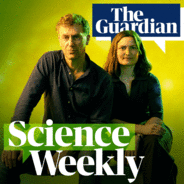Ian Sample meets the Italian physicist Carlo Rovelli to find out about his cutting-edge research into white holes. A white hole is essentially a time-reversed black hole: a region of spacetime where matter spontaneously appears and explodes outwards. At the moment they are hypothetical objects, so Rovelli explains why he thinks they are worth exploring and reveals how they could explain one of the greatest mysteries of physics. Help support our independent journalism at theguardian.com/sciencepod

Wissenschaft & Technik
Science Weekly Folgen
Twice a week, the Guardian brings you the latest science and environment news
Folgen von Science Weekly
300 Folgen
-
Folge vom 26.10.2023Black holes, but backwards: unlocking the mysteries of white holes
-
Folge vom 24.10.2023‘We’ve lost control’: what happens when the west Antarctic ice sheet melts?Madeleine Finlay hears from environment editor Damian Carrington about a new study by the British Antarctic Survey, which shows Antarctic ice may be melting even faster than we thought. He also reflects on the life and career of former environment editor John Vidal, whose death was announced last week. Help support our independent journalism at theguardian.com/sciencepod
-
Folge vom 19.10.2023Could AI help diagnose schizophrenia?Madeleine Finlay meets neuroscientist and psychiatrist Matthew Nour, whose research looks at how artificial intelligence could help doctors and scientists bring precision to diagnosis of psychiatric conditions. He describes his latest study looking at patients with schizophrenia, and explains how he thinks large language models such as ChatGPT could one day be used in the clinic. Help support our independent journalism at theguardian.com/sciencepod
-
Folge vom 17.10.2023Scarier than lions: how fear of ‘super predator’ humans is shaping the animal kingdomIan Sample meets the conservation biologist Liana Zanette, whose recently published research demonstrates that humans are now the super predator, inciting more fear in wild animals than even lions. She explains the ramifications of this knowledge for conservation techniques and the protection of endangered animals. Help support our independent journalism at theguardian.com/sciencepod
